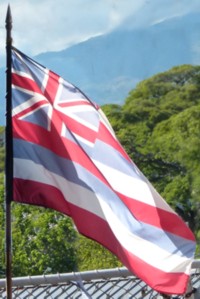Australian Echoes
The discovery of gold in California soon had echoes the other way across the Pacific in Australia.
Small finds of gold had been reported across the various Australian colonies from the earliest days, with a fully substantiated find in 1823, but the last thing the colonial governments wanted was everyone rushing out into the bush to look for gold. The claims were dismissed or kept quiet.
But after the California gold rush caused many to leave Australia, depressing the infant economy, both NSW and Victoria responded by offered prizes to the first to find the gold that they already knew was there.
Thus in 1851 an Englishman Edward Hargraves, who had recent gold prospecting experience in California, claimed the prize and set off the Australian gold rushes. These reversed the flow across the Pacific and resulted in significant population rises; stimulating economic development; leading to the iconic 'diggers'; contributing to the infant labour movement; and thus to Australia's unique style of democracy.
The Hawaiian experience suggested another opportunity.
In 1862 Captain Louis Hope and John Buhot established a sugarcane plantation near Brisbane where Hope operated Australia’s first commercial sugar mill. Sugarcane growing quickly spread along the coast of Queensland and into northern NSW. As slavery was illegal, the Queensland solution was to emulate the Hawaiian growers and recruit indentured labour from the pacific islands. Elsewhere in the Empire indentured labour toiled in the diamond and coal mines of South Africa and on the farms of Rhodesia.
As the Federation of Australia was coming into being the founding fathers had no doubt that indentured labour was disguised slavery and required that Queensland end the practice before it was permitted to join the new Federation. Just a month after the new Federal Legislature first sat in Melbourne the infamous Immigration Restriction Act of 1901 was introduced by the new Prime Minister, Edmund Barton. It had overwhelming support and passed both houses to receive Royal Assent in December 1901.
Thus the first significant act of the new Australian Legislature was to prohibit importing 'coloured labour' to Australia. Existing indentured labour - mainly islanders - known as 'kanakas' were to be deported - giving rise to Australia's first illegal immigrants when some absconded. This became known as the 'White Australia Policy'.
Over the next 60 years this 'policy' became a festering source of tension with other partners in the British Commonwealth, particularly on the sub-continent, Singapore and Hong Kong. It was also mentioned frequently in Russian and particularly Chinese propaganda that I could listen to on my shortwave radio, condemning the 'running dog capitalists'.
On the other hand, supporters of the policy pointed to growing racial tensions between 'whites', now often outnumbered by indentured or enslaved black labourers and their descendants in southern Africa and the United States. Thus the Immigration Restriction Act was amended many times but was not repealed until June 1959 when I was already in High School. It would be several more years before the thorn was fully extracted and Australia would embrace a new wave of Asian immigrants.
Back to the story...
Kamehameha III died in 1854 and was succeeded by his nephew, Alexander Litholiho who was crowned Kamehameha IV.
Alexander had married Emma Rook, the beautiful mixed-race granddaughter of John Young. They were a glittering couple who were received in several of the royal palaces of the world. Kamehameha IV was the first monarch to attempt to curtail the culture-destroying activities of the American missionaries and the growing influence of the less than godly planters.
He was encouraged in this when on a visit to America as a boy in 1850 he was called a 'nigger' and almost thrown off a train, like Ghandi in South Africa. He was outraged saying that he had never been treated in such a way in any other county. He became steadfastly pro-British and the couple named their short-lived first child: Prince Albert.
Alexander, Kamehameha IV, died in 1863 and Lot, Alexander's brother was crowned Kamehameha V. He took note of the planter's growing power and introduced a new constitution to restore power of the Hawaiian electorate. By then the American Civil War 1861-1865 was in progress, see my notes on our visit to southern US states last year. Read here...
This gave another great boost to the Hawaiian sugar industry, now that Southern sugar was no longer available to the world due to the Northern Blockade. As a result sugar prices rose over fivefold.
After the war the South was in ruins and their workforce was freed from their forced labour. US sugar producers struggled behind a tariff. It could be a golden time for Hawaiian sugar growers, if only they could be rid of the protective tariff.

